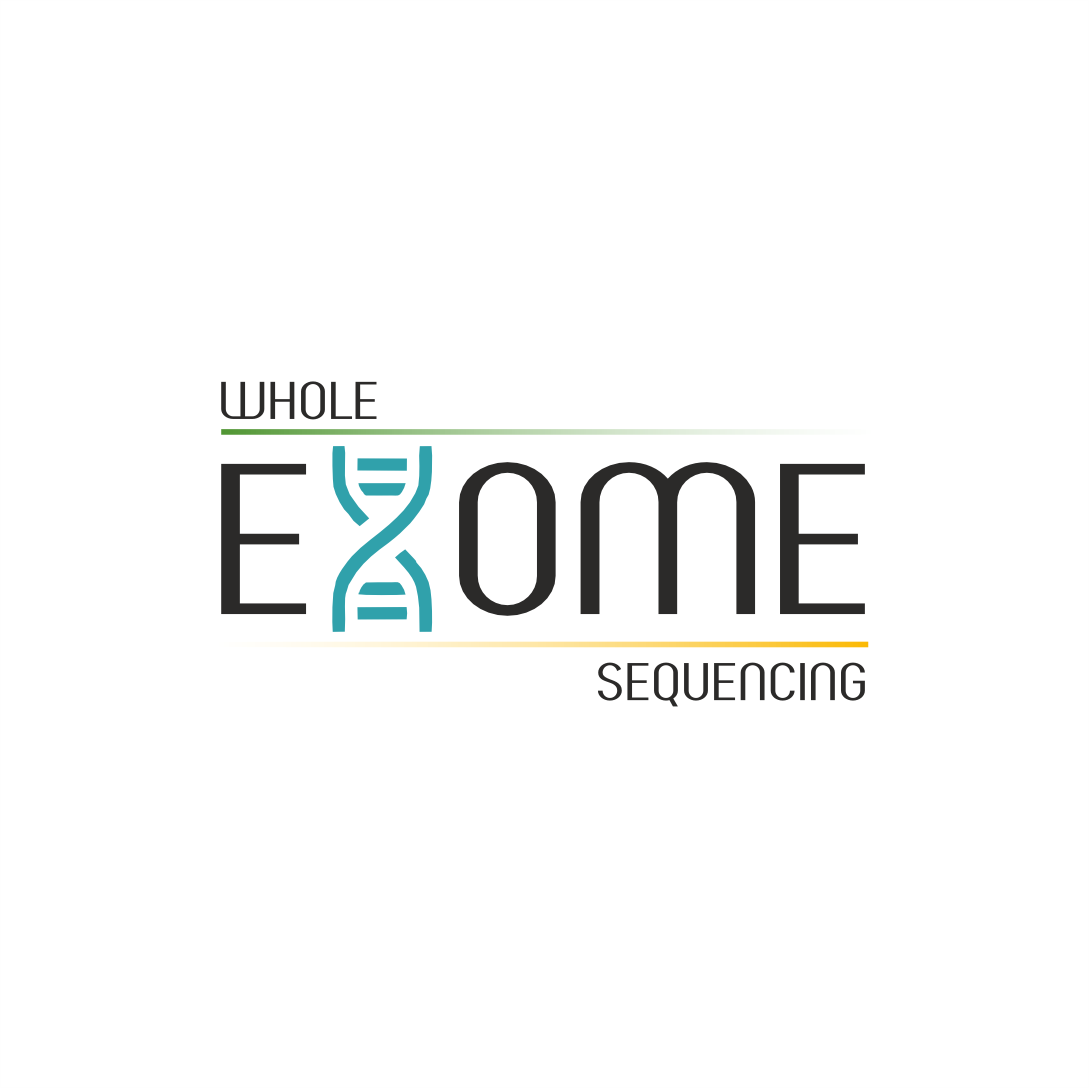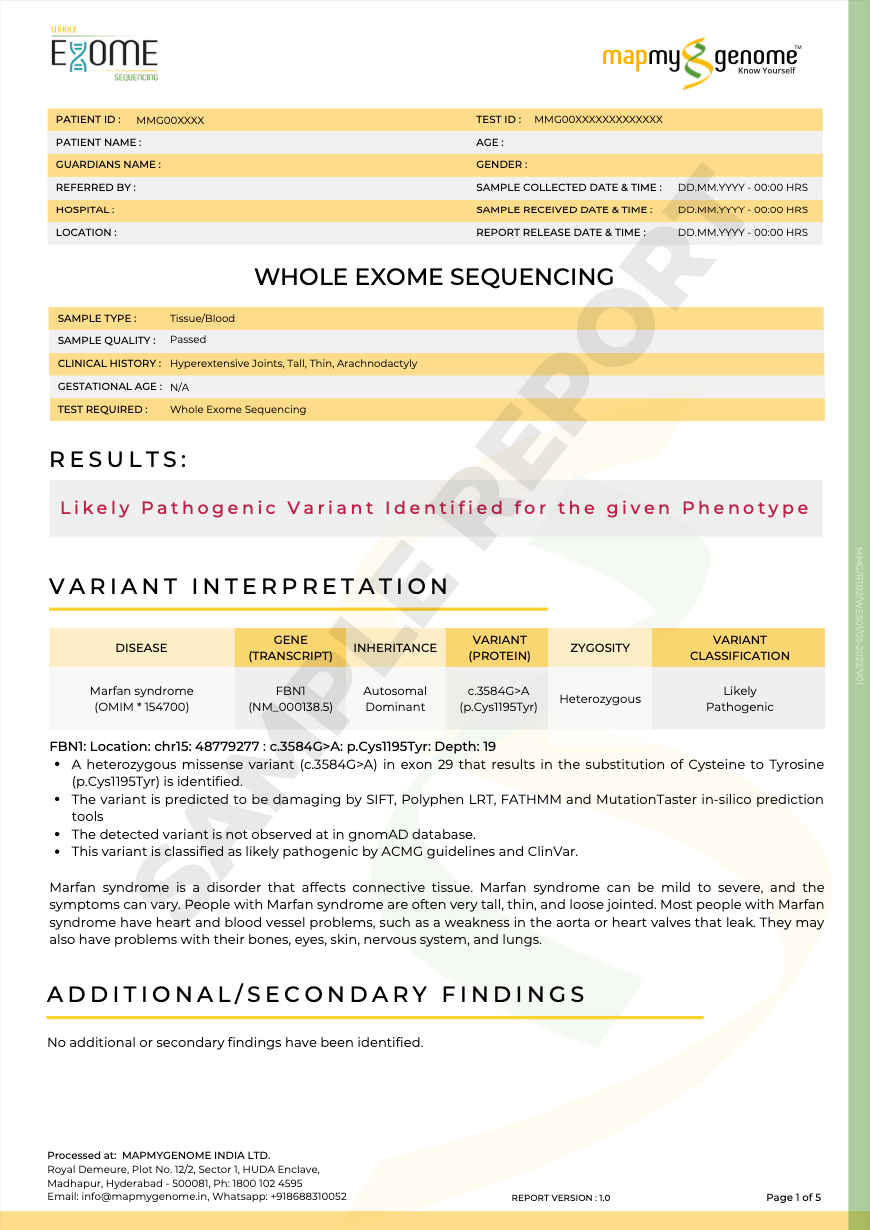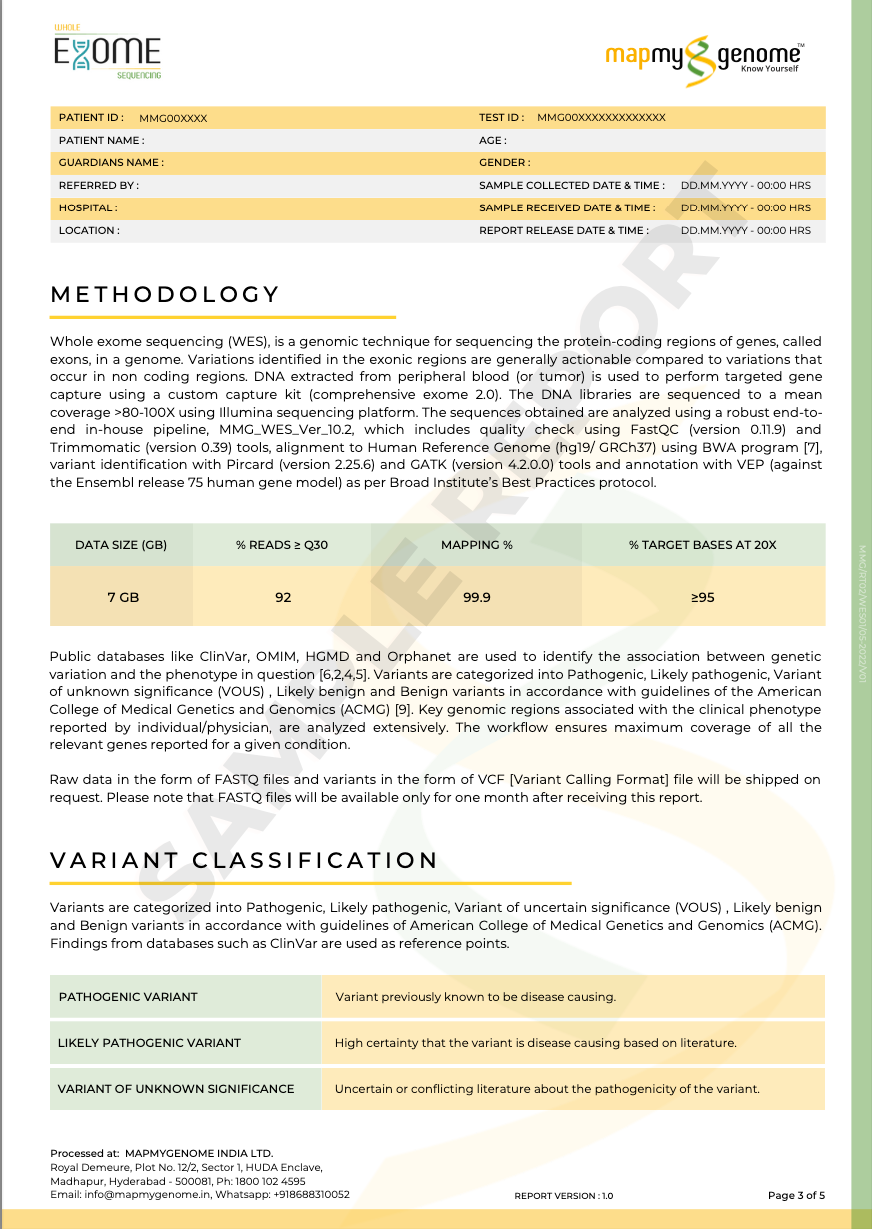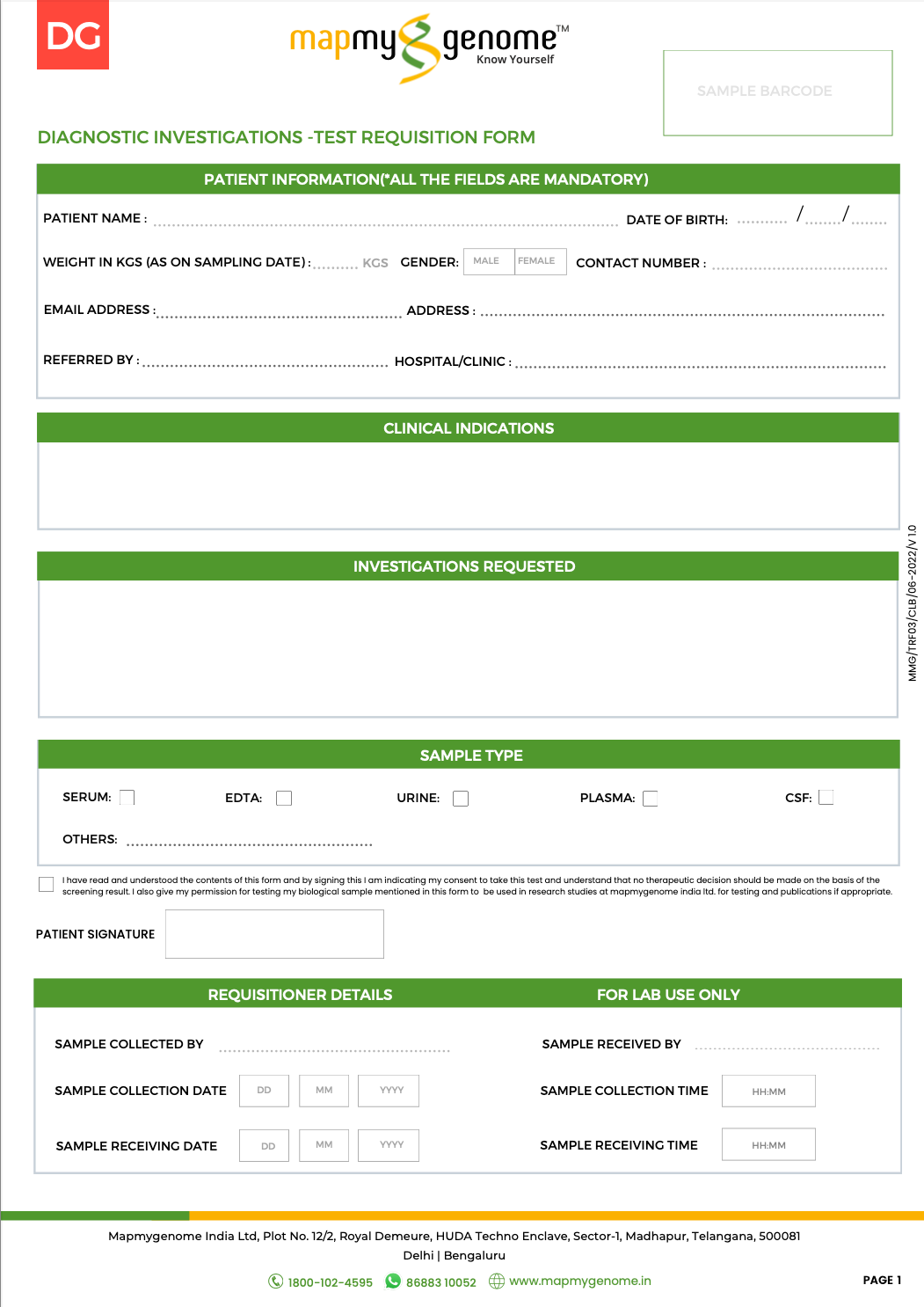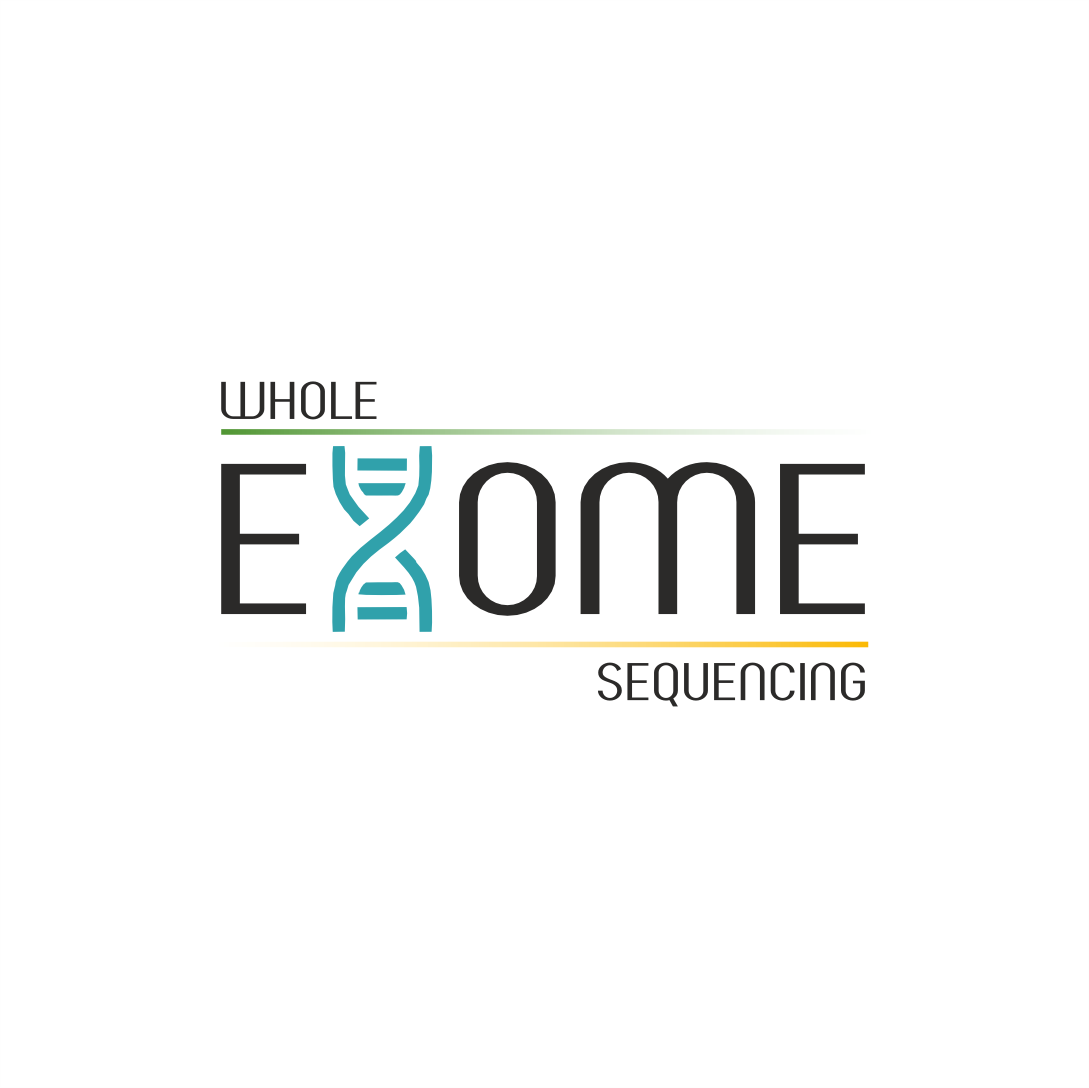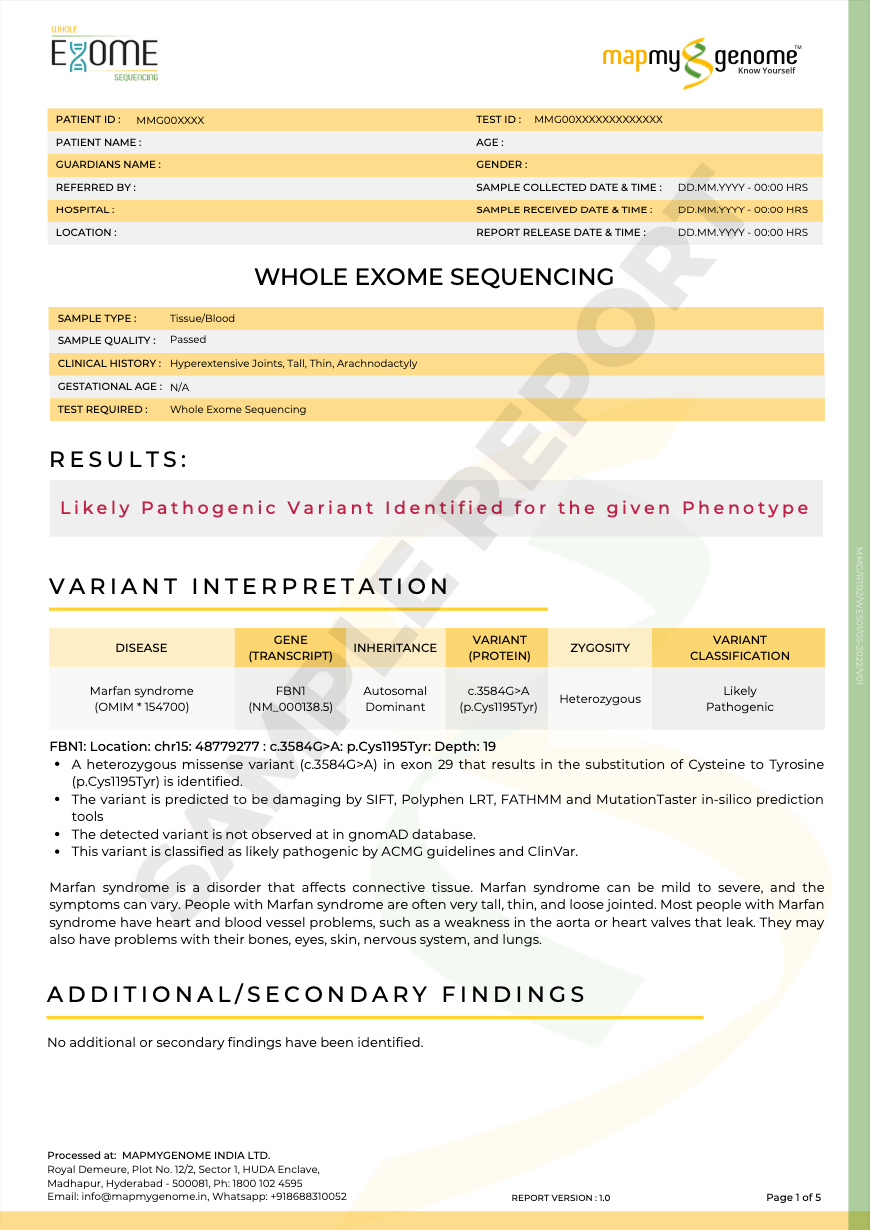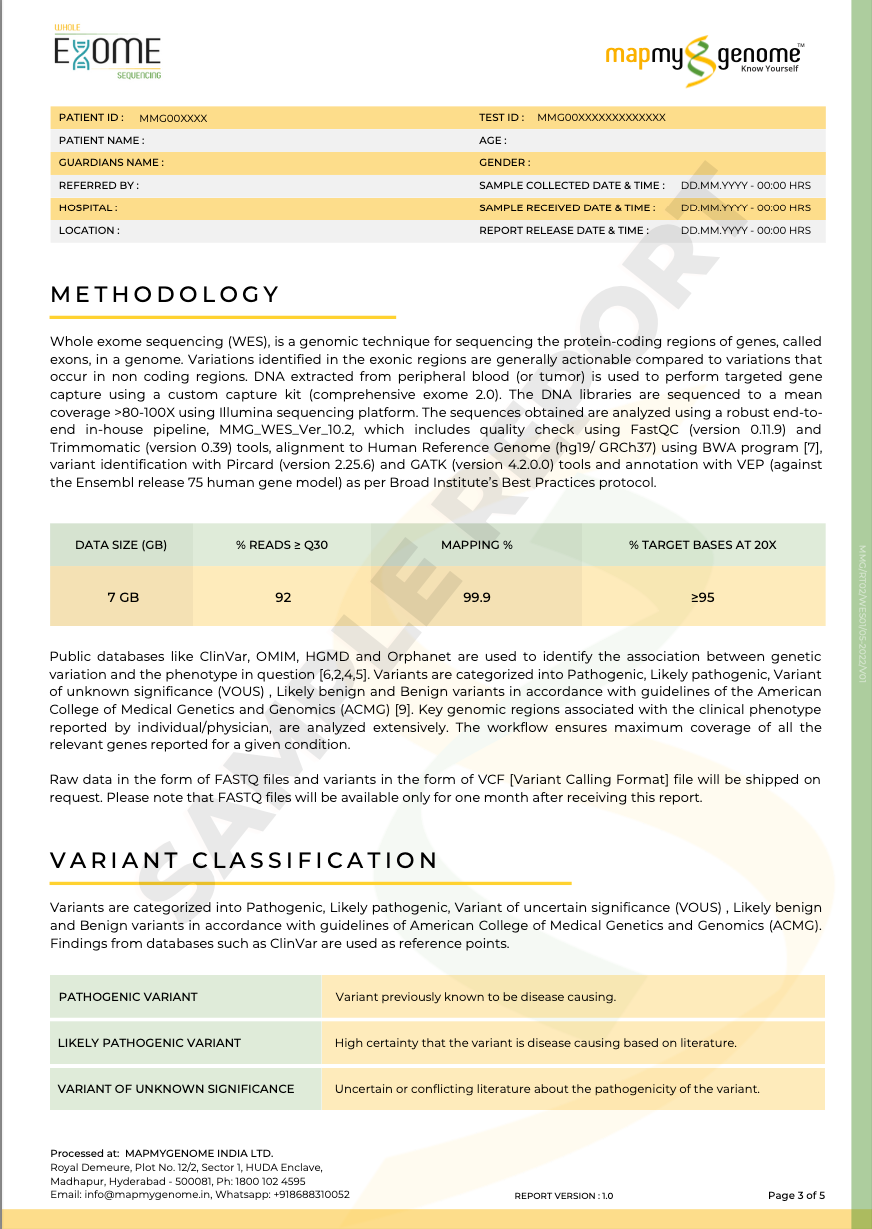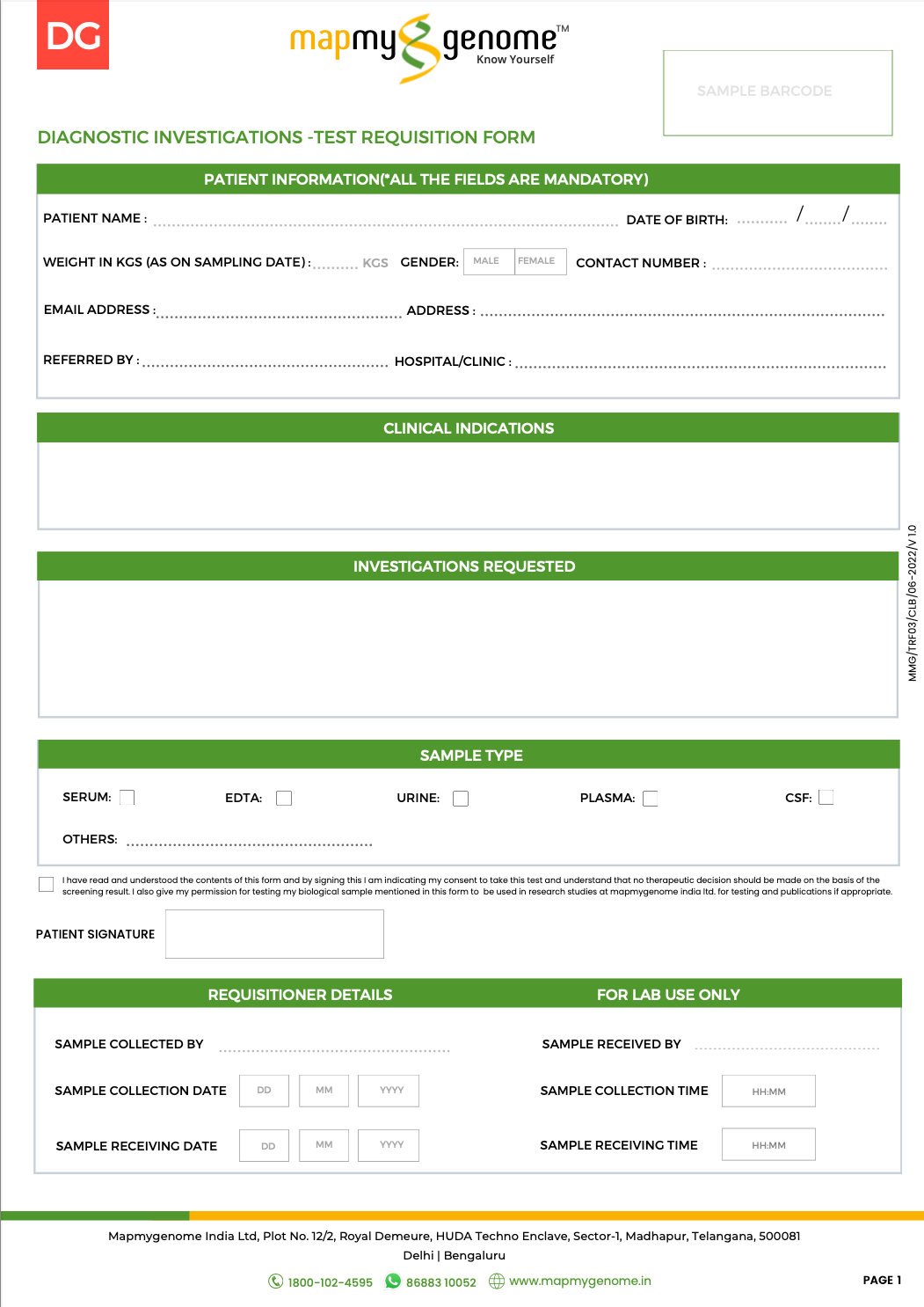क्या आपने कभी होल एक्सोम सीक्वेंसिंग (WES) के बारे में सुना है और सोचा है कि यह कैसे काम करता है या आनुवंशिकी जगत में इसकी इतनी चर्चा क्यों होती है? यदि आप या आपका कोई प्रियजन किसी रहस्यमय बीमारी से जूझ रहे हैं जिसका निदान करना कठिन लगता है, तो आप अकेले नहीं हैं। कई लोग वर्षों तक बिना किसी जवाब के रहते हैं—जब तक कि वे होल एक्सोम सीक्वेंसिंग का प्रयास नहीं करते।
आइए इसे सरल शब्दों में समझते हैं—डब्ल्यूईएस क्या है, यह कैसे मदद करता है, और भारत में होल एक्सोम सीक्वेंसिंग टेस्ट की लागत कितनी है। यह गाइड दुर्लभ बीमारियों के निदान या डब्ल्यूईएस टेस्ट की लागत के बारे में जानकारी खोज रहे किसी भी व्यक्ति के लिए बिल्कुल उपयुक्त है।
होल एक्सोम सीक्वेंसिंग (डब्ल्यूईएस) क्या है?
डब्ल्यूईएस एक उन्नत प्रकार का आनुवंशिक परीक्षण है जो आपके डीएनए के प्रोटीन-कोडिंग क्षेत्रों - जिन्हें एक्सॉन कहा जाता है - का अध्ययन करता है। ये एक्सॉन आपके संपूर्ण जीनोम का केवल 1-2% भाग बनाते हैं, लेकिन इनमें लगभग 85% रोग उत्पन्न करने वाले उत्परिवर्तन पाए जाते हैं। यही कारण है कि दुर्लभ आनुवंशिक स्थितियों का सटीक पता लगाने में डब्ल्यूईएस अत्यंत शक्तिशाली है।
पूरे जीनोम का अनुक्रमण क्यों नहीं किया जाता?
बहुत अच्छा सवाल! जबकि संपूर्ण जीनोम अनुक्रमण में सब कुछ शामिल होता है, वहीं डब्ल्यूईएस उन हिस्सों पर ध्यान केंद्रित करता है जिनसे समस्या होने की सबसे अधिक संभावना होती है—जिससे यह अधिक किफायती और कुशल बन जाता है, खासकर जब समस्या का कारण अज्ञात हो।
WES कैसे काम करता है?
यहां WES के दौरान क्या होता है, इसका एक संक्षिप्त चरण-दर-चरण विवरण दिया गया है:
-
नमूना संग्रह – रक्त या लार का एक छोटा सा नमूना एकत्र किया जाता है।
-
डीएनए निष्कर्षण – आपके डीएनए को अलग किया जाता है और संसाधित किया जाता है।
-
एक्सोम कैप्चर – इसमें केवल एक्सॉन को लक्षित करके बाहर निकाला जाता है।
-
अनुक्रमण – उन्नत मशीनें एक्सोनिक डीएनए को पढ़ती हैं।
-
डेटा विश्लेषण – आनुवंशिकीविद उत्परिवर्तनों की खोज के लिए आपके डेटा की तुलना ज्ञात जीनों से करते हैं।
-
नैदानिक व्याख्या – परिणामों की व्याख्या लक्षणों और चिकित्सा इतिहास के आधार पर की जाती है।
इस डेटा का उपयोग अज्ञात स्वास्थ्य समस्याओं या आनुवंशिक विकारों के निदान के लिए किए जाने पर यह जीवन-परिवर्तनकारी साबित हो सकता है।
होल एक्सोम सीक्वेंसिंग पर किसे विचार करना चाहिए?
WES हर किसी के लिए नहीं है—लेकिन अगर आप इनमें से किसी एक श्रेणी में आते हैं, तो यह आपके लिए गेम-चेंजर साबित हो सकता है:
-
ऐसे परिवार जिनमें दुर्लभ या अज्ञात बीमारियों का इतिहास रहा हो
-
विकास में देरी या बौद्धिक अक्षमता वाले बच्चे
-
जिन लोगों को कम उम्र में ही तंत्रिका संबंधी या मांसपेशियों संबंधी विकार हो जाते हैं
-
आनुवंशिक कैंसर के संदिग्ध रोगियों
-
कई बार निदान में असफल होने के बाद जवाब तलाश रहे व्यक्ति
दुर्लभ बीमारियों के निदान में WES कैसे मदद करता है?
7,000 से अधिक दुर्लभ बीमारियाँ हैं—और इनमें से कई आनुवंशिक हैं। इन बीमारियों के लक्षण अक्सर एक जैसे होते हैं, जिससे निदान मुश्किल हो जाता है। WES एक जासूस की तरह काम करता है, आपके जीनों में छिपे उत्परिवर्तनों को स्कैन करता है और व्यक्तिगत जानकारी प्रदान करता है।
WES के माध्यम से आमतौर पर निदान की जाने वाली स्थितियाँ:
-
मांसपेशीय डिस्ट्रोफी
-
मिर्गी और दौरे संबंधी विकार
-
आत्मकेंद्रित स्पेक्ट्रम विकार
-
माइटोकॉन्ड्रियल रोग
-
प्राथमिक प्रतिरक्षाहीनता
-
वंशानुगत चयापचय सिंड्रोम
अक्सर, लोगों को विशेषज्ञों के पास भेजा जाता है, कई परीक्षण करवाए जाते हैं, और फिर भी उन्हें कोई जवाब नहीं मिलता। WES इस निदान प्रक्रिया को छोटा करने में मदद करता है।
भारत में होल एक्सोम सीक्वेंसिंग टेस्ट की कीमत
अब चलिए उस विषय पर बात करते हैं जो सबके मन में है— भारत में WES टेस्ट की लागत ।
प्रयोगशाला, परिणाम आने में लगने वाला समय और कार्यक्षेत्र (एकल, त्रिक या विस्तारित परिवार) के आधार पर, भारत में संपूर्ण एक्सोम अनुक्रमण परीक्षण की कीमत निम्न प्रकार से लेकर हो सकती है:
-
₹25,000 से ₹60,000 (बेसिक सोलो WES)
-
₹60,000 से ₹1,20,000 (तीनों के लिए WES परीक्षण - बच्चे और दोनों माता-पिता का परीक्षण)
-
विस्तृत विश्लेषण और तत्काल रिपोर्टों के लिए उच्च शुल्क लिया जाता है।
सलाह: हमेशा यह जांच लें कि परीक्षण के बाद की जेनेटिक काउंसलिंग कीमत में शामिल है या नहीं।
WES और अन्य आनुवंशिक परीक्षण: इनमें क्या अंतर है?
| विशेषता | संपूर्ण एक्सोम अनुक्रमण | लक्षित जीन पैनल | संपूर्ण जीनोम अनुक्रमण |
|---|---|---|---|
| कवरेज | जीनोम का 1-2% (एक्सॉन) | केवल विशिष्ट जीन | जीनोम का 100% |
| लागत | मध्यम | कम | उच्च |
| उदाहरण | अनिर्धारित मामले | ज्ञात स्थिति | गहन शोध या अज्ञात |
| बदलाव का समय | 3-6 सप्ताह | 2-4 सप्ताह | 4-8 सप्ताह |
WES की कुछ सीमाएँ जो आपको जाननी चाहिए
कोई भी परीक्षण परिपूर्ण नहीं होता, और WES की भी अपनी सीमाएं हैं:
-
नॉन-कोडिंग वेरिएंट छूट सकते हैं
-
संरचनात्मक परिवर्तनों का ठीक से पता नहीं लगा पाता
-
व्याख्या जटिल हो सकती है
-
कभी-कभी अज्ञात महत्व के वेरिएंट (VUS) देता है
इसीलिए परीक्षण से पहले और बाद में विशेषज्ञ आनुवंशिक परामर्श आवश्यक है।
संपूर्ण एक्सोम अनुक्रमण के लाभ
- दुर्लभ स्थितियों के आनुवंशिक कारणों का पता लगाता है
- अनावश्यक परीक्षणों से बचकर समय और धन की बचत होती है।
- परिवार नियोजन और प्रसवपूर्व परामर्श में सहायता करता है
- उपचार योजना और रोग निदान के लिए उपयोगी
- अन्य असंबंधित स्थितियों के जोखिमों का पता लगा सकता है
वास्तविक जीवन का उदाहरण
केस स्टडी: गंभीर विकासात्मक विलंब से ग्रस्त बच्चा
वैश्विक विकासात्मक विलंब से ग्रस्त एक तीन वर्षीय बच्चे को कई बार अस्पताल ले जाया गया, लेकिन कोई स्पष्ट निदान नहीं मिल पाया। डॉक्टरों ने डब्ल्यूईएस परीक्षण कराने का आदेश दिया, जिससे एक तंत्रिका संबंधी विकार से जुड़े जीन में एक दुर्लभ उत्परिवर्तन का पता चला। इससे सही निदान, लक्षित उपचार और भावी भाई-बहनों के लिए बहुमूल्य जानकारी प्राप्त करने में मदद मिली।
अक्सर पूछे जाने वाले प्रश्न: संपूर्ण एक्सोम अनुक्रमण के बारे में उपयोगी सुझाव
प्रश्न 1: क्या भारत में WES बीमा के अंतर्गत आता है?
भारत में अधिकांश स्वास्थ्य बीमा योजनाएं अभी तक आनुवंशिक परीक्षण को कवर नहीं करती हैं , लेकिन अपने स्वास्थ्य सेवा प्रदाता से इस बारे में जानकारी लेना हमेशा बेहतर होता है। कुछ योजनाएं निदान किए गए आनुवंशिक विकारों के लिए इसे कवर करती हैं।
प्रश्न 2: WES डीएनए वंश परीक्षण से किस प्रकार भिन्न है?
वंश परीक्षण आपके मूल पर केंद्रित होते हैं। वहीं, WES चिकित्सा और नैदानिक जानकारी पर ध्यान केंद्रित करता है, विशेष रूप से आनुवंशिक विकारों का पता लगाने के लिए।
प्रश्न 3: क्या मुझे डब्ल्यूईएस या जीन पैनल करवाना चाहिए?
यदि डॉक्टर किसी विशिष्ट बीमारी (जैसे स्तन कैंसर के लिए BRCA) का संदेह करते हैं, तो पैनल परीक्षण बेहतर हो सकता है। लेकिन जिन स्थितियों का निदान नहीं हुआ है या जो जटिल हैं , उनके लिए WES व्यापक जानकारी प्रदान करता है।
प्रश्न 4: क्या डब्ल्यूईएस मुझे बता सकता है कि मुझे भविष्य में कोई बीमारी होगी या नहीं?
कभी-कभी। WES से ऐसे उत्परिवर्तन का पता चल सकता है जो आपके जोखिम को बढ़ा सकते हैं , लेकिन यह इस बात की गारंटी नहीं देता कि आपको बीमारी हो ही जाएगी। यह जोखिम की भविष्यवाणी करने के बारे में अधिक है, निश्चितता के बारे में नहीं।
प्रश्न 5: डब्ल्यूईएस कितना सटीक है?
WES कोडिंग क्षेत्र के विभिन्न रूपों का पता लगाने में अत्यधिक सटीक है। लेकिन यह बड़े विलोपन, दोहराव या माइटोकॉन्ड्रियल डीएनए उत्परिवर्तन के लिए आदर्श नहीं है।
निष्कर्ष: क्या WES फायदेमंद है?
यदि आप या आपके किसी प्रियजन को अस्पष्ट स्वास्थ्य समस्याओं का सामना करना पड़ रहा है या आपके परिवार में दुर्लभ बीमारियों का इतिहास है, तो होल एक्सोम सीक्वेंसिंग आपके लिए मददगार साबित हो सकती है। यह दुर्लभ आनुवंशिक विकारों का पता लगाने का एक शक्तिशाली, विस्तृत और तेजी से किफायती तरीका है—विशेष रूप से भारत में, जहां उच्च स्तरीय निदान सुविधाओं तक पहुंच में तेजी से सुधार हो रहा है।
सिर्फ अनुमान मत लगाओ। परीक्षण करो।
शुरू करने के लिए तैयार हैं?
- किसी प्रमाणित जेनेटिक काउंसलर से बात करें।
- सटीकता के लिए NABL से मान्यता प्राप्त प्रयोगशाला का चयन करें।
- लागत, समयसीमा और इसमें क्या-क्या शामिल है, इसके बारे में पूछें।
- WES के साथ अपने स्वास्थ्य और पारिवारिक भविष्य की जिम्मेदारी लें।



